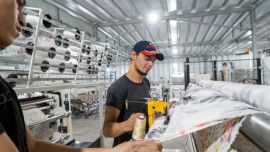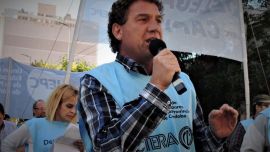Recently returned from his woodland retreat and disconnected from the news for the last fortnight, the New England economist Dr Hale finds himself with plenty of catching up to do. He writes :
“The less said about my time in the wilderness, the better – if you’ve seen one tree, you’ve seen them all and the forest is literally for the birds. I had fancied myself entering into the souls of such New England literary greats as Henry David Thoreau (‘Walden’) and Robert Frost (‘The woods are lovely, dark and deep./But I have promises to keep,/And miles to go before I sleep’) but it was a stultifying rather than enriching experience. Which now leaves me scrambling to read up on everything happening in my absence. Still not fully up to date on Argentina but among other things, I was stunned to see the dollar skyrocketing from 33-plus to a peak of 41-plus in a single day (August 30) and then to see President Mauricio Macri halving his Cabinet this week (with initial expectations that it would be slashed to a third). Anyway my question for you this week is extremely simple – what the heck is going on down there?”
My reply:
“I neither know how to start nor where all this is going to end. Regarding that manic Thursday last week, my own pet theory is that Macri’s pathetic, counterproductive 100-second message to the nation the previous day unaccompanied by anything from his economic team was a key trigger of collapsing confidence – he came across as entirely clueless apart from running back to the International Monetary Fund (IMF) less than a quarter after the previous agreement. The government clearly learned from its error because they sought to begin this week on the right foot with the fiscal announcements early on Monday morning – first Macri placed them in context with a sensible speech 15 times longer than the previous week’s bleat and then Nicolás Dujovne (promoted from Treasury to Economy Minister with the Cabinet shrinkage) spelled them out clearly.
“That’s my take but there are other explanations, of course. No lack of analysts who see the lack of confidence as being rather longer-term with a certain pessimism regarding electoral prospects and social patience in Argentina, given that there is still no light at the end of the tunnel of recession. And there are also technical factors – once runs like in late August start, they become self-justifying because nobody wants to let their dollars go if sure they’ll be worth more in the next hour. The dollar had to burst the 40-peso barrier before finding sellers, finally closing the day around 38.50. It is also hard not to relate the intensified demand for greenbacks to the acceleration in phasing out Lebacs – the bond alternatives offered have yet to gain credibility in a volatile financial climate. But whether dollars, bond issues or sky-high interest rates of 60 percent, there is too much money in money – too much speculation for the health of the Argentine economy.
“And what were the announcements at the start of the week? I can give you the full demotion details of the Cabinet downsizing if you like (only the titles changed, not the names) but you seem to have picked up on that – the main change is former Modernisation minister Andrés Ibarra as Cabinet Chief Marcos Peña’s deputy, displacing Mario Quintana and Gustavo Lopetegui, once Macri’s ‘eyes and ears’ (especially for the economy).
“Among the fiscal measures to bring ahead zero deficit to next year from 2020, undoubtedly the most attention has fallen on the future export levy. Not only does this fly in the face of the export-led growth always urged by Macri – if this government can revert to the export duties of Kirchnerism, when are capital controls going to make their comeback with a dollar this wild, the most alarmist voices ask? What are three or four pesos between friends when measured against the recent values of the dollar, the government might reply, pointing to the huge devaluation windfalls accruing to export sectors? This latest version of export duty (always an infamous tax on production and a bad message for the next harvest) at least has the virtue of being a fixed sum, thus being less of a disincentive to increasing output and exports.
“When it reaches the panic levels of late August, this currency crisis has to be rated as the worst since the meltdown at the start of this century but at the same time it does not bear comparison, which makes analysis all the more elusive. In contrast to the convertibility crisis, there is exchange rate flexibility (perhaps more than at almost any other time this century), low indebtedness (thanks to creditor phobia toward Kirchnerism) with ample funds for the next payments due thanks to the IMF and a relatively solid banking system. The main problem (and it is a big one in such a dollarised economy) is the shortage of foreign exchange amid the adversity of a drought-stricken balance of payments and low productivity to compete internationally for more outside agriculture (with almost all industries notoriously needing more dollars to import inputs than they earn from exports). Since more dollars are a remote prospect other than from the IMF, the only alternative is less pesos if inflation (falling even further behind devaluation in recent days) is not to spin out of control, even if slowed by recession – hence the acceleration of zero deficit (which will not suffice for confidence if limited to the primary deficit as until now, grandly overlooking debt payments while speeding up the transfers from the IMF).
“While the dollar has yet to test the 40-peso mark with any intensity so far this month, the crisis is far from over – country risk remains closer to 800 than 700 points. The run on the currency will not be stopped by the daily trickle of selling off a few hundred million dollars of reserves – hence the negotiations with the IMF to give free rein to a ‘shock and awe’ display of firepower. Until then the economy remains in the worst of both worlds with both the dollar and interest rates simultaneously high.
“None of this does very much to answer your question but so many things have yet to fall into shape – we have to see what Dujovne achieves in Washington and the clock has already started ticking in the final week to define the 2019 budget by the statutory September 15 deadline for submission to Congress.
‘You may be out of the woods, Dr Hale, but not Argentina.”related news





















Comments